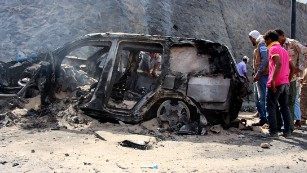Washington – Top U.S. intelligence officials said Tuesday that ISIS was likely to attempt direct attacks on the U.S. in the coming year and that the group was infiltrating refugees escaping from Iraq and Syria to move across borders.
ISIS “will probably attempt to conduct additional attacks in Europe, and attempt to direct attacks on the U.S. homeland in 2016,” Lt. Gen. Vincent Stewart, director of the Defense Intelligence Agency, testified on Capitol Hill Tuesday.
Director of National Intelligence James Clapper, who was also at the Senate Armed Services Committee hearing, estimated that violent extremists were active in about 40 countries and that there currently exist more terrorist safe havens “than at any time in history.”

Clapper warned that ISIS and its eight branches were the No. 1 terrorist threat, and that it was using the refugee exodus from violence in Iraq and Syria to hide among innocent civilians in order to reach other countries.
Clapper said ISIS was “taking advantage of the torrent of migrants to insert operatives into that flow,” adding that they were “pretty skilled at phony passports so they can travel ostensibly as legitimate travelers.”
ISIS fighters have reportedly seized Syrian passport facilities with machines capable of manufacturing passports.
The testimony follows the director of National Intelligence’s release of the “Worldwide Threat Assessment of the U.S. Intelligence Community.”
The assessment notes that “approximately five dozen” ISIS-linked people were arrested in the U.S. during 2015.
Clapper said that more than 38,200 foreign fighters, including at least 6,900 from Western countries, have traveled to Syria from more than 100 countries since 2012.
On the counter-ISIS campaign in Iraq and Syria, Stewart said it was unlikely that the Iraqi city of Mosul would be liberated in 2016.
READ: Terror threat in Europe ‘as high as it’s ever been,’ officials say
While the assessment calls ISIS the “preeminent terrorist threat,” Clapper also said that “al Qaeda affiliates are positioned to make gains in 2016.”
Clapper called the Yemen-based al Qaida in the Arabian Peninsula and the Syria-based al Nusra Front the “most capable al Qaeda branches.”
The testimony also touched on the Iran nuclear deal, cybersecurity and cyber-espionage, North Korea’s nuclear and missile program and Russia’s military build-up.
